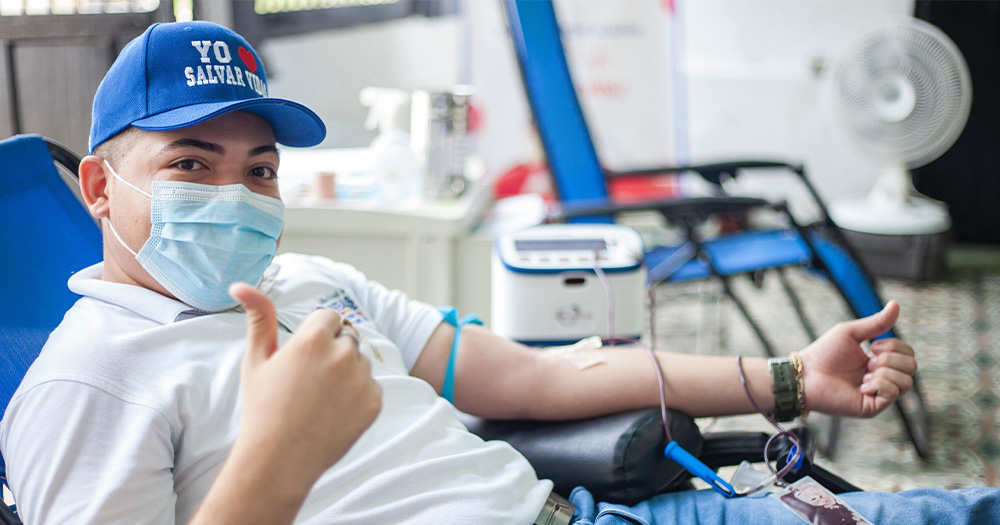On Tuesday, November 15, the Irish Blood Transfusion Service (IBTS) announced that it is updating its process to determine donor eligibility, making it more fair and inclusive. Anyone who wishes to donate blood will now be assessed on a person-by-person basis, rather than having risks associated with specific demographics applied to their case, as has been done in the past. Traditionally, this has disproportionately impacted gay, bisexual and other men who have sex with men (gbMSM) as well as trans people.
Individual Donor Risk Assessment will come into effect in Ireland from Monday, November 28, and is similar to the system that was introduced in the UK Blood Services in 2021. It aims to welcome new donors regardless of gender or sexual identity, and the new application process eliminates gender-specific sexual risk questions.
The same guidelines will now be in place for straight and queer people, and ultimately, anyone who is in an exclusive long-term relationship (over four months) will be eligible to donate, regardless of their gender and sexual orientation or those of their partner. While social behaviours such as engaging in chemsex or having anal sex with new or multiple partners still restrict a person from donating blood, this will not be specific to gbMSM or trans applicants.
Permanent exclusions will be given to people who have used injections for chemsex, as well as people who have ever been diagnosed with syphilis or gonorrhea. HIV Positive people and their partners are also not eligible to donate, while other STIs warrant a four-month deferral. In addition, if a person has taken PrEP, PEP or ART within the previous four months at the time of applying, they also will be unable to give blood.
It is expected that the IBTS will lose approximately 4% of current donors with the new system, but that many more LGBTQ+ patients will be able to give blood.
From 28th Nov the IBTS will introduce a system of assessing donor’s eligibility to donate on a person-by-person basis rather than applying risks associated with specific populations which have previously excluded some potential donors.
For more see https://t.co/IeCNv4sBGM
— IBTS Education & Research (@ibts_education) November 15, 2022
Speaking about the new guidelines, Dr Tor Hervig, IBTS Medical & Scientific Director stated: “This is a fairer way to assess donor risk. Using a donor’s individual behaviours to determine if that person is eligible to donate makes the process fairer for all donors and more inclusive, while maintaining the safety of the blood supply. Every donor will be asked the same questions about their sexual activity, regardless of the donor’s gender or sexual orientation, or those of his/her partner.”
The changes come as a result of the recommendations made by the Social Behaviours Review Group (SBRG), an independent advisory committee that was established to review the evidence base for donor eligibility in Ireland.
“The SBRG identified several factors associated with a higher risk of acquiring blood-borne infection. These factors include: engaging in chemsex, having anal sex with a new partner or more than one partner and having a recent sexually transmitted infection. They recommended that questions about these factors should be added to the donor health and lifestyle questionnaires that would be answered by all donors,” Dr Hervig explained.
“The IBTS will monitor changes in the rates of viral infections and syphilis in blood donors and any reported transfusion-transmitted infections in patients who have received blood. A compliance study will also be undertaken to determine if donors are complying with the new donor eligibility criteria.”
HIV Ireland has welcomed the news, with Executive Director Stephen O’Hare saying: “The new policy, which will be applied to all potential donors, is a key step in the ongoing development of what can eventually be a world leading blood donation policy in Ireland.”
Adding to this, MPOWER Programme Manager and member of the SBRG, Adam Shanley, said that this is something that activists have been fighting “to have changed for many years”.
While the progress is praised, Shanley also expressed disappointment surrounding the continued presence of certain restrictions.
“In reviewing ongoing deferral policies, every consideration should be given by the IBTS to the weight of robust scientific evidence on the efficacy of available treatments for STIs including in relation to sexual partners living with HIV who are virally supressed and cannot pass on HIV through sex,” he said.
© 2022 GCN (Gay Community News). All rights reserved.
Support GCN
GCN is a free, vital resource for Ireland’s LGBTQ+ community since 1988.
GCN is a trading name of National LGBT Federation CLG, a registered charity - Charity Number: 20034580.
GCN relies on the generous support of the community and allies to sustain the crucial work that we do. Producing GCN is costly, and, in an industry which has been hugely impacted by rising costs, we need your support to help sustain and grow this vital resource.
Supporting GCN for as little as €1.99 per month will help us continue our work as Ireland’s free, independent LGBTQ+ media.

comments. Please sign in to comment.